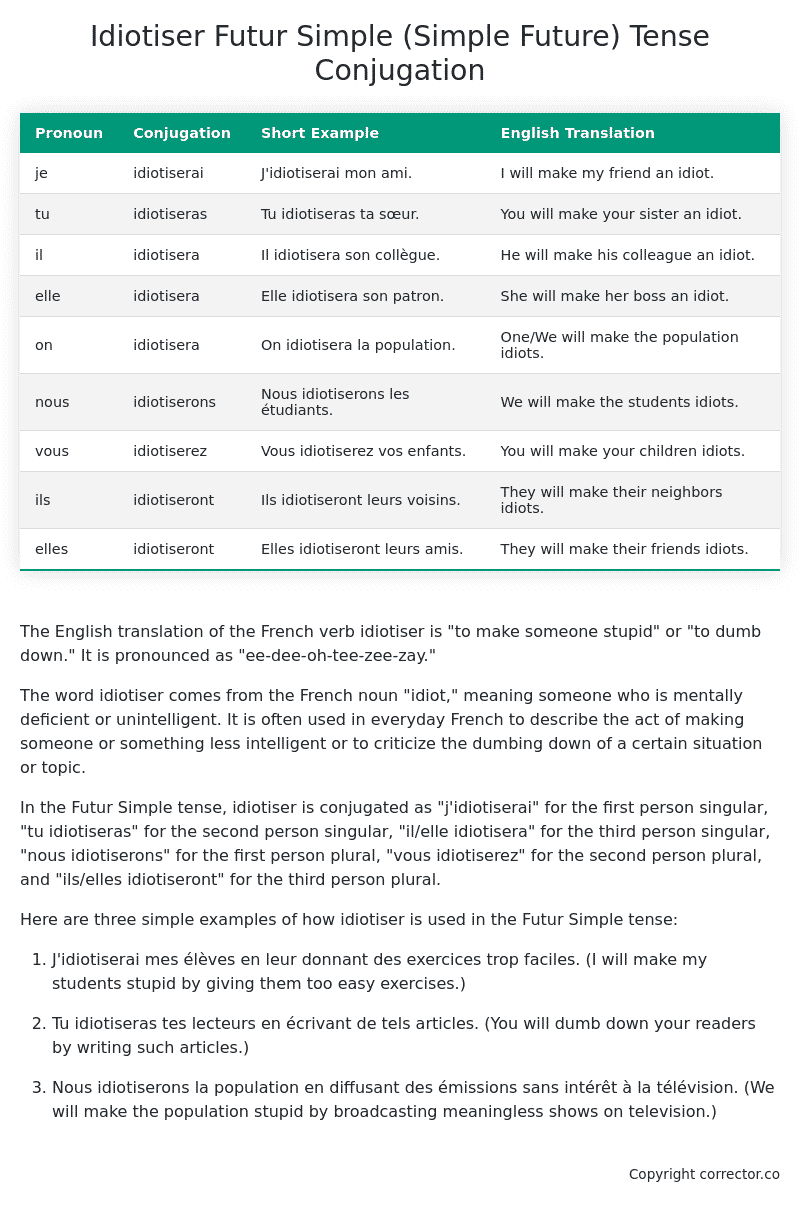Futur Simple (Simple Future) Tense Conjugation of the French Verb idiotiser
Introduction to the verb idiotiser
The English translation of the French verb idiotiser is “to make someone stupid” or “to dumb down.” It is pronounced as “ee-dee-oh-tee-zee-zay.”
The word idiotiser comes from the French noun “idiot,” meaning someone who is mentally deficient or unintelligent. It is often used in everyday French to describe the act of making someone or something less intelligent or to criticize the dumbing down of a certain situation or topic.
In the Futur Simple tense, idiotiser is conjugated as “j’idiotiserai” for the first person singular, “tu idiotiseras” for the second person singular, “il/elle idiotisera” for the third person singular, “nous idiotiserons” for the first person plural, “vous idiotiserez” for the second person plural, and “ils/elles idiotiseront” for the third person plural.
Here are three simple examples of how idiotiser is used in the Futur Simple tense:
-
J’idiotiserai mes élèves en leur donnant des exercices trop faciles. (I will make my students stupid by giving them too easy exercises.)
-
Tu idiotiseras tes lecteurs en écrivant de tels articles. (You will dumb down your readers by writing such articles.)
-
Nous idiotiserons la population en diffusant des émissions sans intérêt à la télévision. (We will make the population stupid by broadcasting meaningless shows on television.)
Table of the Futur Simple (Simple Future) Tense Conjugation of idiotiser
| Pronoun | Conjugation | Short Example | English Translation |
|---|---|---|---|
| je | idiotiserai | J’idiotiserai mon ami. | I will make my friend an idiot. |
| tu | idiotiseras | Tu idiotiseras ta sœur. | You will make your sister an idiot. |
| il | idiotisera | Il idiotisera son collègue. | He will make his colleague an idiot. |
| elle | idiotisera | Elle idiotisera son patron. | She will make her boss an idiot. |
| on | idiotisera | On idiotisera la population. | One/We will make the population idiots. |
| nous | idiotiserons | Nous idiotiserons les étudiants. | We will make the students idiots. |
| vous | idiotiserez | Vous idiotiserez vos enfants. | You will make your children idiots. |
| ils | idiotiseront | Ils idiotiseront leurs voisins. | They will make their neighbors idiots. |
| elles | idiotiseront | Elles idiotiseront leurs amis. | They will make their friends idiots. |
Other Conjugations for Idiotiser.
Le Present (Present Tense) Conjugation of the French Verb idiotiser
Imparfait (Imperfect) Tense Conjugation of the French Verb idiotiser
Passé Simple (Simple Past) Tense Conjugation of the French Verb idiotiser
Passé Composé (Present Perfect) Tense Conjugation of the French Verb idiotiser
Futur Simple (Simple Future) Tense Conjugation of the French Verb idiotiser (this article)
Futur Proche (Near Future) Tense Conjugation of the French Verb idiotiser
Plus-que-parfait (Pluperfect) Tense Conjugation of the French Verb idiotiser
Passé Antérieur (Past Anterior) Tense Conjugation of the French Verb idiotiser
Futur Antérieur (Future Anterior) Tense Conjugation of the French Verb idiotiser
Subjonctif Présent (Subjunctive Present) Tense Conjugation of the French Verb idiotiser
Subjonctif Passé (Subjunctive Past) Tense Conjugation of the French Verb idiotiser
Subjonctif Imparfait (Subjunctive Imperfect) Tense Conjugation of the French Verb idiotiser
Subjonctif Plus-que-parfait (Subjunctive Pluperfect) Tense Conjugation of the French Verb idiotiser
Conditionnel Présent (Conditional Present) Tense Conjugation of the French Verb idiotiser
Conditionnel Passé (Conditional Past) Tense Conjugation of the French Verb idiotiser
L’impératif Présent (Imperative Present) Tense Conjugation of the French Verb idiotiser
L’infinitif Présent (Infinitive Present) Tense Conjugation of the French Verb idiotiser
Struggling with French verbs or the language in general? Why not use our free French Grammar Checker – no registration required!
Get a FREE Download Study Sheet of this Conjugation 🔥
Simply right click the image below, click “save image” and get your free reference for the idiotiser Futur Simple tense conjugation!

Idiotiser – About the French Futur Simple (Simple Future) Tense
Formation of Futur Simple
For regular -er verbs (e.g., parler – to speak)
For regular -ir verbs (e.g., finir – to finish)
For regular -re verbs (e.g., vendre – to sell)
Common Everyday Usage Patterns
Conditional Statements
Interactions with Other Tenses
Futur Antérieur
Conditional
Present
Summary
I hope you enjoyed this article on the verb idiotiser. Still in a learning mood? Check out another TOTALLY random French verb conjugation!


